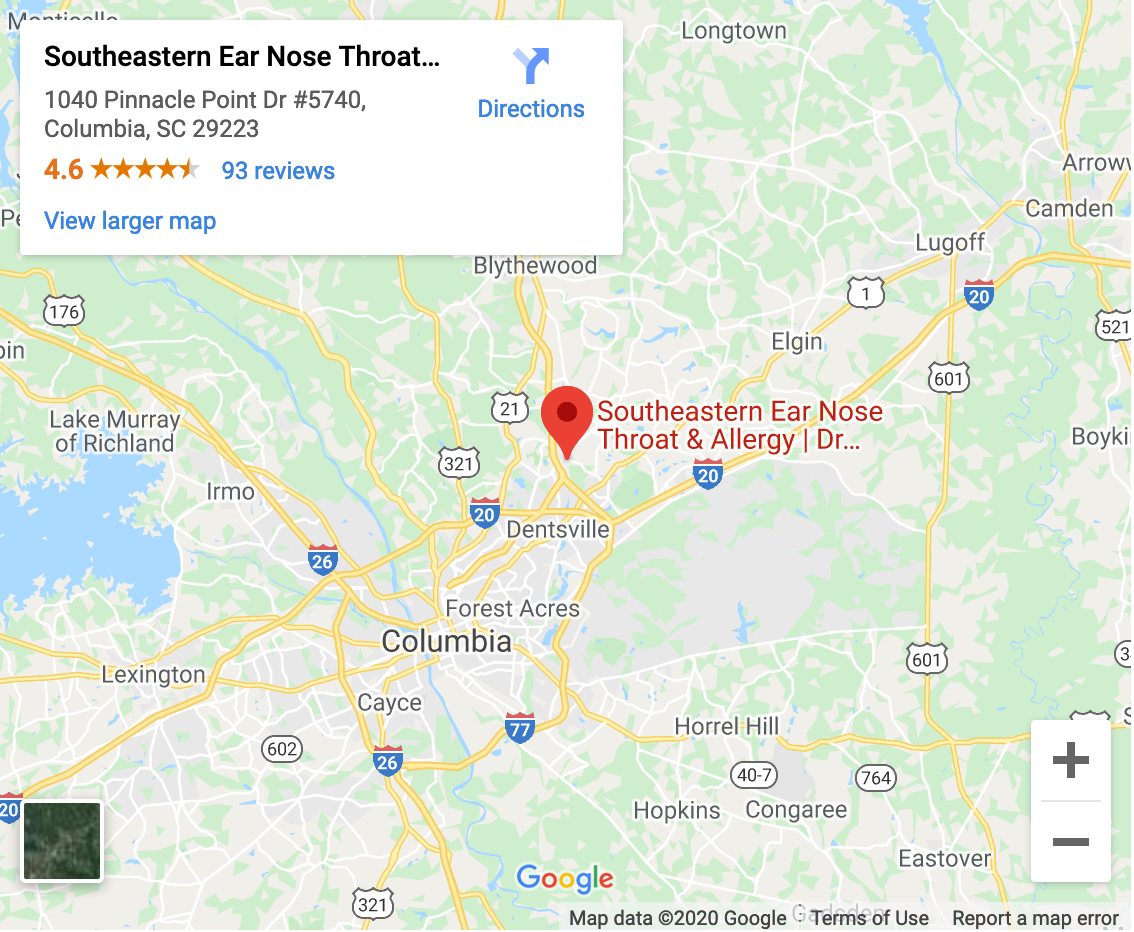Services: Allergy & Sinus
If you answered yes...
... to any of these questions, you may be suffering from inhalant allergies. Inhalants are small particles of pollen, mold, dust, or animal dander that are released into the environment. In genetically predisposed individuals, the immune system responds improperly to this material and creates an inflammatory reaction.
This inflammatory reaction can occur in several areas of the body including the eyes, nose, sinuses, ears, lungs, and skin. This leads to the classic nasal and eye symptoms listed above, referred to as allergic rhinitis, but can also initiate or worsen asthmatic symptoms (cough, shortness of breath, wheezing).
Learn MoreSinus
Do you suffer from nasal congestion, facial pressure or headaches?
Do you get multiple rounds of antibiotics yearly for “sinus infections”?
Have you been diagnosed with "chronic sinusitis"?
If you answered yes...
... to these questions, you have likely been diagnosed with “sinusitis,” one of most commonly made diagnoses in the United States each year. It accounts for significant patient visits to Primary Care offices and ENT offices.
The term “sinusitis” refers to generalized inflammation of the sinuses. Common causes of inflammation in the nose are allergies (“hay fever”), acute viral infections, or tobacco smoke. Other important causes include bacterial infections, fungal/mold allergies, and obstructive inflammation due to polyps or abnormally enlarged turbinates. There are two major types of sinusitis, acute and chronic.
Learn MoreOffice Hours
| Mon - Thur | 8:00 - 5:00 |
| Fri | 8:00 - 4:00 |
Allergy Shot Hours
| Mo, Tu, Th | 8:10 - 4:45 |
| Wed | 1:00 - 4:45 |
| Fri | 8:10 - 3:45 |
Make An Appointment
We look forward to caring for you!
(803) 509-7200
Visit Our Office
Allergy
Diagnosis and Treatments

How are allergies diagnosed and treated?
Allergies are typically diagnosed by history. The initial treatment often consists of avoiding the offending inhalant and starting medication. Typical medications that are used in the initial treatment of allergic symptoms are non-sedating antihistamines (Zyrtec, Claritin, Allegra, etc.) and nasal sprays. Nasal sprays can consist of a topical antihistamine spray (Patanase, Astelin) or a topical steroid spray (Nasonex, Flonase, etc.). In patients who do not respond to medications or if the diagnosis of allergy is uncertain, an allergy skin test is often performed. The allergy skin test usually takes less than 1 hour and is almost always tolerated in adults and children. It can be done with minimal discomfort under the right conditions. Skin testing allows the appropriate identification of inhalants that are causing the symptoms and helps tailor a treatment plan. Patients who continue to suffer with debilitating symptoms despite medical and conservative therapy are often recommended for allergy shot treatment, and less commonly, sublingual immunotherapy (allergy drops).
Allergy Shots (Immunotherapy): Proven Relief and Treatment without Surgery
Allergy shots, also known as immunotherapy, have been the cornerstone of allergy treatment for decades. Allergy injections have been proven to desensitize the immune system and eliminate the inflammatory response created by the inhalant particles. Immunotherapy is typically performed weekly for 3-5 years from the time of the initial allergy test. Patients typically experience symptom relief within 3-6 months of beginning the shots and then continue to improve slowly over the course of treatment. Many patients can be safely placed on home immunotherapy after a period of time. In the majority of patients, a long-term cure is achieved and the need for continuing allergy medications is avoided.




- Any healthy patient over the age of 4 who is unable or unwilling to undergo weekly injections in the physician office.
- Children who are needle phobic and difficult to inject.
- Patients taking medications such as beta-blockers in whom allergy shots pose an increased risk for a systemic reaction.
- Stable patients who have a very mild allergic asthma who are poor candidates for allergy shots.
- The treatment is typically not covered by insurance and requires an out of pocket expense
- The therapy is given DAILY instead of weekly and many patients find this frequent dosing regimen difficult to maintain. Sublingual immunotherapy is ideal for people with a hectic work or travel schedule who cannot comply with office shots.
Sinus
“Sinusitis” is one of most commonly made diagnoses in the United States each year and accounts for significant patient visits to Primary Care offices and ENT offices.
The term “sinusitis” refers to generalized inflammation of the sinuses. Common causes of inflammation in the nose are allergies (“hay fever”), acute viral infections, or tobacco smoke. Other important causes include bacterial infections, fungal/mold allergies, and obstructive inflammation due to polyps or abnormally enlarged turbinates. There are two major types of sinusitis, acute and chronic.

Acute sinusitis is an infection that resolves in less than four weeks. This is usually caused by an upper respiratory illness, often initially viral in nature which progresses to a secondary bacterial infection.
Chronic sinusitis involves recurring or persistent infections and symptoms that can last twelve weeks or more. Chronic sinusitis can be associated with multiple different medical conditions and may be further categorized by its association with nasal polyps in some patients.
Causes of Chronic Sinusitus
1. Chronic sinusitis secondary to allergic rhinitis This is overwhelmingly the cause of most complaints of chronic sinusitis in the Southeastern United States. This is a disease state that can often be cured by medical therapy, including allergy immunotherapy, rather than by surgical intervention. Some severely allergic patients will form nasal polyps and this may require surgical intervention to give the patient adequate relief of their symptoms.
2. Allergic Fungal Sinusitis This is an unusual disease process which occurs most commonly and was first described in the Southeastern United States. It is described by the presence of an allergic immune state, nasal polyps, and the formation of “allergic mucin” in the sinuses. This disease is often treated by a combination of medical and surgical therapy.
3. Sampter’s Triad Asthma This is a unique condition where certain patients have a classic symptom triad of asthma, nasal polyps, and an allergy to Aspirin and other non-steroidal anti-inflammatory medications (NSAIDs). Again, the treatment of this disease requires a combination of medical and surgical therapy.
4. Chronic Bacterial Infection This occurs in a patient who has poorly developed natural sinus openings and, due to inflammation/obstruction, gets a chronic bacterial infection of the sinuses. This is usually treated medically but in refractory cases may require surgery.
Treatments for Acute and Chronic Sinusitus
The standard medical treatment of acute or chronic sinusitis is often performed with antibiotics, decongestants, nasal steroid sprays, antihistamines and/or flushing of the sinuses. If these medical treatments fail, surgery may be required to enlarge the sinus openings in order to restore normal sinus function and breathing.
BEWARE: Many patients who undergo sinus surgery (see Functional Endoscopic Sinus Surgery (FESS) and Balloon Sinuplasty) may have been candidates for aggressive medical therapy which could have avoided a surgical sinus procedure. The overwhelmingly cause of chronic sinusitis, in the experience of Dr. Gunnlaugsson, is due to allergic rhinitis and altered nasal anatomy (a deviated septum and/or turbinate hypertrophy). In most patients, aggressive allergy care and treatment can eliminate the abnormal facial and nasal symptoms which is the cause of the “chronic sinusitis” in these patients. After a prolonged period of allergy treatment, anatomic nasal surgery (see Deviated Nasal Septum Repair and Surgery for Nasal Obstruction) may be performed in a small subset of patients to completely relieve their symptoms. Sinus surgery is reserved for patients who truly have impaired drainage pathways of the sinuses causing the offending symptoms.
In recent years, Balloon Sinuplasty has been touted as a “breakthrough” office based procedure for chronic sinusitis. It is important for the patient to realize that a Balloon Sinuplasty is simply a new device to open blocked sinus pathways – it is not a revolutionary new concept. Furthermore, the reimbursement for balloon sinuplasty has driven a marked increase in this procedure over the past decade. Balloon Sinuplasty does have a role in the treatment of certain patients with sinus disorders, but it is not a “one size fits all” procedure. It does not address underlying anatomical abnormalities of the septum or turbinates, and most importantly is does not address nasal mucosal inflammation secondary to underlying allergies.
Dr. Gunnlaugsson provides a comprehensive evaluation of the patient with chronic sinusitis and a personalized plan for each patient based on the cause of their symptoms. As a Fellow of the American Academy of Otolaryngic Allergy and with over a decade of experience treating patients with both ENT and Allergy disorders, Dr. Gunnlaugsson is uniquely qualified to evaluate each patient from both a medical and surgical perspective. Surgical intervention is always considered a last resort when all other attempts at medical intervention have failed.
We look forward to caring for you!
(803) 509-7200






